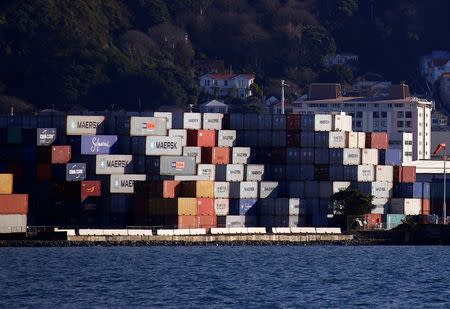Oil, weaker currency sharply lifts New Zealand inflation; central bank seen 'patient'
By Marius Zaharia
WELLINGTON (Reuters) - New Zealand's inflation accelerated sharply in the third quarter, driven by higher fuel prices and a weaker currency, though analysts expect the central bank to look past those transitory factors and keep rates low for an extended period.
Chances for future rate cuts, which were already very slim but were left on the table by policymakers in recent comments, were seen diminishing. This gave some support to the New Zealand dollar and pushed bond yields 2-3 basis points higher.
Consumer prices rose 1.9 percent year-on-year in the third quarter, compared with a median forecast in a Reuters poll of 1.7 percent and up from 1.5 percent in the second quarter, data showed on Tuesday. Inflation is now close to the Reserve Bank of New Zealand's (RBNZ) target mid-point of 2.0 percent.
But RBNZ was expected to look past the headline numbers and keep to a commitment to hold interest rates at a record low through 2019 and into 2020, as there were few compelling signs of stronger underlying price pressures.
"With core measures still relatively subdued, we expect the RBNZ to remain patient, even if headline CPI rises above 2.0 percent in the near term," ASB economists said in a note.
"We continue to expect the RBNZ to leave (rates) on hold until early 2020."
Inflation excluding volatile food and energy prices, edged up marginally, to 1.2 percent year-on-year from 1.1 percent. Other core measures were also little changed: the trimmed mean held steady at 1.8 percent, while the weighted median slowed to 2.2 percent from 2.3 percent.
The RBNZ’s own measure of core inflation, the sectoral factor model, was unchanged at 1.7 percent year-on-year.
NO NEED TO CUT
Question marks about the strength of economic activity in New Zealand remained. Business confidence was at a nine-year low and manufacturing activity remained below its long-term average, while hiring and investment intentions have been falling.
"All told, the RBNZ will probably look through the jump in energy prices and conclude that underlying inflation isn’t strong enough yet to meet its inflation target ... so there’s no need to rush to raise interest rates," said Marcel Thieliant, senior Australia and New Zealand economist at Capital Economics.
"Equally, though, the RBNZ doesn’t need to cut."
On Tuesday, RBNZ said the secretary to the Treasury, Gabriel Makhlouf, has accepted its invitation to attend future monetary policy meetings as an observer, with the aim of ensuring smooth transition to the new monetary policy framework being developed by the new Labour-led government.
The new framework adds employment to RBNZ's goals, while keeping inflation as a target. Some analysts have said the employment consideration might make the central bank more tolerant of higher inflation if other economic activity gauges remain unconvincing.
Quarter-on-quarter, inflation was 0.9 percent, versus a 0.7 percent forecast in the Reuters poll and 0.4 percent in the previous three-month period, the data showed.
A 19 percent on-year jump in petrol prices in September, the highest annual increase since June 2011, was the main driver behind the jump in inflation, Stats NZ said. It was the first time petrol prices had risen for four consecutive quarters since September 2008, during the global financial crisis.
The falling exchange rate made consumer tech goods more expensive, the stats office said. The kiwi firmed 0.4 percent on the day to $0.6575, pulling further away from a 32-month trough around $0.6424.
(Reporting by Marius Zaharia; editing by Clive McKeef & Shri Navaratnam)

 Yahoo Finance
Yahoo Finance 

